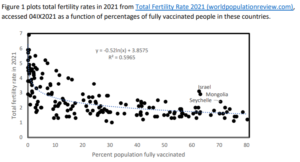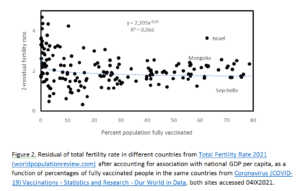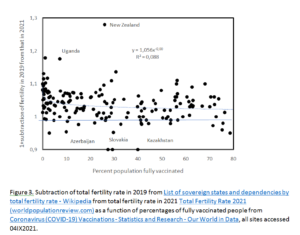4 oct. 2021
Karlsruhe Institute of Technology (KIT) Institute of Microstructure Technology Professor Dr. Hervé Seligmann examined fertility in countries that have massively vaccinated against COVID-19 compared to those that have not, and concludes that women’s fertility decreases the more women are vaccinated.
According to the data presented by Shimabukuro et al (2021), of the 127 women who were vaccinated in the first 20 weeks, 82% resulted in miscarriage.
The article by Shimabukuro et al. 2021 presents preliminary safety results of coronavirus 2019 mRNA vaccines used in pregnant women from the V-Safe Registry. These findings are of particular importance, as pregnant women were excluded from the phase III trials assessing mRNA vaccines.
In table 4, the authors report a rate of spontaneous abortions <20 weeks (SA) of 12.5% (104 abortions/827 completed pregnancies). However, this rate should be based on the number of women who were at risk of an SA due to vaccine receipt and should exclude the 700 women who were vaccinated in their third-trimester (104/127 = 82%). They acknowledge this rate will likely decrease as the pregnancies of women who were vaccinated <20 weeks complete but believe the rate will be higher than 12.5%. However, given the importance of these findings they feel it important to report these rates accurately. Additionally, the authors indicate that the rate of SAs in the published literature is between 10% and 26%. However, the upper cited rate includes clinically-unrecognized pregnancies, which does not reflect the clinically-recognized pregnancies of this cohort and should be removed.
In the first graph one can see a decrease in fertility the more a country vaccinates, with 3 countries clear outliers, Israel, Mongolia, and Seychelles:

In the second graph, the data are corrected according to the wealth of the countries (poorer countries have higher fertility). After the correction, Seychelles and Mongolia return to the norm, and only Israel continues to enjoy relatively high fertility despite the high percentage of vaccinated women:

Although Dr. Seligmann does not explain the reason for the Israeli anomaly, Nakim Organization Director Haim Yativ says the abnormality in Israel can be explained by the fact that Israel is Pfizer’s laboratory state, and that it must have been given a high percentage of placebo recipients to test the vaccine results against them as a control group.
In the third graph, Dr. Seligmann compares the fertility data of 2019 with 2021. From the graph one can see the declining trend in fertility the more women get vaccinated. At the same time it can be seen that on average in 2021 fertility was higher than in 2019, possibly explained by COVID-19 lockdowns and/or other social factors related to the situation:

In conclusion, Dr. Seligman estimates that fertility damage should soon appear to be even more severe due to the effect of vaccines on men and pregnancy.
“Comparisons between countries show lower fertility associated with female vaccination,” he writes. “This is in line with suspicions of greater adverse pregnancy risks in women vaccinated during the first pregnancy trimester. It is possible that male vaccination effects independent of female vaccination effects would be detectable if fertility was estimated by pregnancy numbers, not numbers of births, over a longer period, as male fertility affects more directly pregnancy frequencies and more indirectly pregnancy outcomes. Data analyzed reflect almost exclusively vaccine effects during pregnancy. Soon, effects of vaccination on the period before conception, including on men, should appear and strengthen the decrease in fertility observed at this point.”
To read his study, click here.
Haim Yativ notes that the births do not guarantee the health of the babies born to vaccinated parents, and that reports of genetic defects in various places have not been investigated but rather ignored.
https://www.bitchute.com/embed/U1ZVqOl7GxQV/
He also notes that at this stage it is not possible to draw conclusions about harm to male fertility, and that “we will have to wait 9 months from the time the vaccination campaign began in various countries, but already at this stage we can refer to the many warnings by experts of sterilization and/or genetic damage to their future offspring.”
“Effects of vaccination on fertility will likely increase as effects on preconception periods, men included, will become more common, beyond effects of vaccination during pregnancy,” Yativ concludes.
https://www.bitchute.com/embed/ZLDOO5Jnsp0E/
posted by Mordechai Sones
_______________________________
If you like our work please consider to donate :
Related posts:
Views: 15
 RSS Feed
RSS Feed

















 October 9th, 2021
October 9th, 2021  Awake Goy
Awake Goy  Posted in
Posted in  Tags:
Tags: 
















